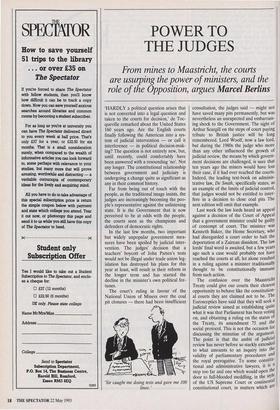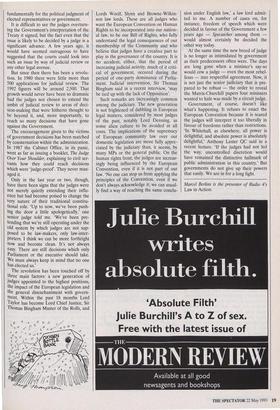POWER TO THE JUDGES
From mines to Maastricht, the courts are usurping the power of ministers, and the
role of the Opposition, argues Marcel Berlins
`HARDLY a political question arises that is not converted into a legal question and taken to the courts for decision,' de Toc- queville remarked about the United States 160 years ago. Are the English courts finally following the American into a sys- tem of judicial intervention — or call it interference — in political decision-mak- ing? The question is not entirely new, but, until recently, could comfortably have been answered with a resounding 'no'. Not any longer. The constitutional relationship between government and judiciary is undergoing a change quite as significant as any in their common history.
Far from being out of touch with the people, as the traditional image insists, the judges are increasingly becoming the peo- ple's representative against the unlistening state. It is the Government that is now perceived to be at odds with the people, the courts seen as the champions and defenders of democratic rights.
In the last few months, two important but widely unpopular government mea- sures have been spoiled by judicial inter- vention. The judges' decision that a teachers' boycott of John Patten's tests would not be illegal under trade union leg- islation has destroyed his plans for this year at least, will result in their reform in the longer term and has started the decline in the minister's own political for- tunes.
The court's ruling in favour ' of the National Union of Miners over the coal pit closures — there had been insufficient `Sir caught me doing tests and gave me 100 lines.' consultation, the judges said — might not have saved many pits permanently, but was nevertheless an unexpected and embarrass- ing shock to the Government. The sight of Arthur Scargill on the steps of court paying tribute to British justice will be long remembered. Lord Woolf, now a law lord, but during the 1980s the judge who more than any other influenced the growth of judicial review, the means by which govern- ment decisions are challenged, is sure that ten years ago the miners would have lost their case, if it had ever reached the courts. Indeed, the leading text-book on adminis- trative law, De Smith, specifically states, as an example of the limits of judicial control, that judges would not be entitled to inter- fere in a decision to close coal pits The next edition will omit that example.
Last week the law lords heard an appeal against a decision of the Court of Appeal that a government minister could be guilty of contempt of court. The minister was Kenneth Baker, the Home Secretary, who had disregarded a court order to halt the deportation of a Zairean dissident. The law lords' final word is awaited, but a few years ago such a case would probably not have reached the courts at all, let alone resulted in a ruling against a minister traditionally thought to be constitutionally immune from such action.
The confusion over the Maastricht Treaty could give our courts their clearest opportunity to behave like the constitution- al courts they are claimed not to be. The Eurosceptics have said that they will seek a judicial review aimed at establishing quite what it was that Parliament has been voting on, and obtaining a ruling on the status of the Treaty, its amendment 75 and the social protocol. This is not the occasion for discussing the minutiae of the argument. The point is that the ambit of judicial review has never before so starkly extended to what amounts to an inquiry into the validity of parliamentary procedures and the royal prerogative. To some constitu- tional and administrative lawyers, it Is 3 step too far and one which would open the door to full-blooded meddling, in the stYle, of the US Supreme Court or continental constitutional court, in matters which are
fundamentally for the political judgment of elected representatives or government.
It is difficult to see the judges overturn- ing the Government's interpretation of the Treaty it signed, but the fact even that the issue is likely to be decided by a judge is a significant advance. A few years ago, it would have seemed outrageous to have suggested that the courts could look into such an issue by way of judicial review or any other legal avenue.
But since then there has been a revolu- tion. In 1980 there were little more than 500 applications for judicial review. The 1992 figures will be around 2,500. That growth would never have been so dramatic had the judges not chosen to extend the ambit of judicial review to areas of deci- sion-making that were hitherto thought to be beyond it, and, more importantly, to reach so many decisions that have gone against the Government.
The encouragement given to the victims of government decisions has been matched by consternation within the administration. In 1987 the Cabinet Office, in its panic, went as far as issuing a booklet, The Judge Over Your Shoulder, explaining to civil ser- vants how they could reach decisions which were 'judge-proof. They never man- aged it.
Only in the last year or two, though, have there been signs that the judges were not merely quietly extending their influ- ence but had become poised to change the very nature of their traditional constitu- tional role. 'Up to now, we've been push- ing the door a little apologetically,' one senior judge told me. 'We've been pre- tending that we're still operating under the old system by which judges are not sup- posed to be law-makers, only law-inter- preters. I think we can be more forthright now and become clean. It's not always easy. There are still decisions which only Parliament or the executive should take. We must always keep in mind that no one has elected us.'
The revolution has been touched off by three main factors: a new generation of Judges appointed to the highest positions, the impact of the European legislation and the general disenchantment with govern- ment. Within the past 18 months Lord Taylor has become Lord Chief Justice, Sir Thomas Bingham Master of the Rolls, and Lords Woolf, Slynn and Browne-Wilkin- son law lords. These are all judges who want the European Convention on Human Rights to be incorporated into our nation- al law, to be our Bill of Rights, who fully understand the legal consequences of our membership of the Community and who believe that judges have a creative part to play in the governance of the country. It is no accident, either, that the period of increasing judicial activity, much of it criti- cal of government, occured during the period of one-party dominance of Parlia- ment. Judicial intervention, Sir Thomas Bingham said in a recent interview, 'may be tied up with the lack of Opposition'.
Such remarks are increasingly common among the judiciary. The new generation is not frightened of dabbling in European legal matters, considered by most judges of the past, notably Lord Denning, as some alien culture to be avoided at all costs. The implications of the supremacy of European community law over our domestic legislation are more fully appre- ciated by the judiciary than, it seems, by many MPs or the general public. On the human rights front, the judges are increas- ingly being influenced by the European Convention, even if it is not part of our law. 'No one can stop us from applying the principles of the Convention, even if we don't always acknowledge it we can usual- ly find a way of reaching the same conclu- sion under English law,' a law lord admit- ted to me. A number of cases on, for instance, freedom of speech which were decided in favour of the Government a few years ago — Spycatcher among them would almost certainly be decided the other way today.
At the same time the new breed of judge is no longer as intimidated by government as their predecessors often were. The days are long gone when a minister's say-so would cow a judge — even the most rebel- lious — into respectful agreement. Now, it is not just the senior judiciary that is pre- pared to be robust — the order to reveal the Matrix-Churchill papers four ministers wanted to hide was made by a circuit judge.
Government, of course, doesn't like what's happening. It refuses to enact the European Convention because it is scared the judges will interpret it too liberally in favour of freedoms rather than restrictions. `In Whitehall, as elsewhere, all power is delightful, and absolute power is absolutely delightful,' Anthony Lester QC said in a recent lecture. 'If the judges had not led the way, uncontrolled discretion would have remained the distinctive hallmark of public administration in this country.' But governments do not give up their powers that easily. We are in for a long fight.
Marcel Berlins is the presenter of Radio 4's Law in Action.



















































 Previous page
Previous page